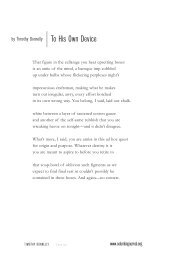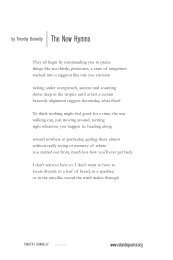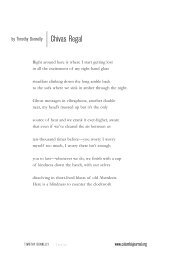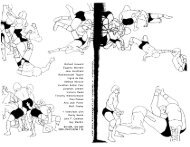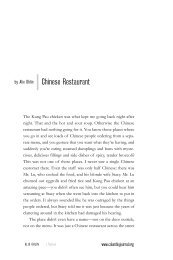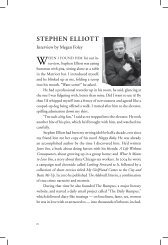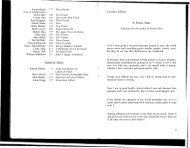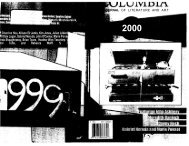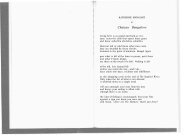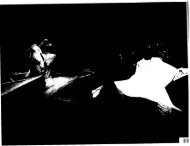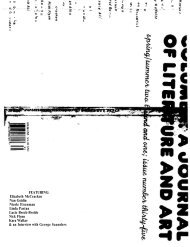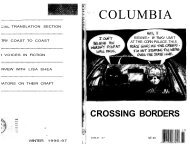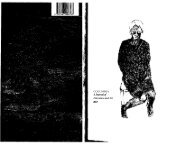Issue 3 - Columbia: A Journal of Literature and Art
Issue 3 - Columbia: A Journal of Literature and Art
Issue 3 - Columbia: A Journal of Literature and Art
Create successful ePaper yourself
Turn your PDF publications into a flip-book with our unique Google optimized e-Paper software.
C: You have translated Whitman into Polish, <strong>and</strong> he<br />
seems to be an influence, along with the Bible, in your newer<br />
work, especially in "From the Rising <strong>of</strong> the Sun' [Bells In<br />
Winter, Ecco Press].<br />
M: Yes, yes. Though let us say that Whitman was<br />
not the only poet who used the long line. There is a<br />
whole tradition, quite a strong tradition, a very venerable<br />
tradition. That's the problem, for instance, when<br />
translating the Psalms. I tried to preserve what is called<br />
in French verset biblique, biblical verse. There is no word<br />
in English for verset, just verse. The translators <strong>of</strong> the<br />
King James Bible translated it into prose, while newer<br />
translators divide it into sections <strong>and</strong> write in a column,<br />
which in my opinion is also wrong. The idea is to preserve<br />
the flow, what you refer to as Whitmanesque, <strong>and</strong><br />
we know that Whitman was inspired by the Bible; <strong>and</strong><br />
also observe caesuras inside, because caesuras are justified.<br />
In the original Hebrew you have signs for<br />
caesuras. So I mark the caesuras by little stars.<br />
C: Earlier you mentioned your awareness <strong>of</strong> the "historical<br />
situation". Did you find it difficult to come to this country,<br />
where our sense <strong>of</strong> tradition <strong>and</strong> history is rather weak, <strong>and</strong><br />
very little <strong>of</strong> our poetry seems written from any sense <strong>of</strong> tradition?<br />
M: Well, maybe things change. Immediately after<br />
the end <strong>of</strong> the War when I went abroad for the first<br />
time, I was connected with the Warsaw government,<br />
the new government. I had my own poems, written<br />
during the War, <strong>and</strong> some poems written by other<br />
Polish poets, <strong>and</strong> I tried to communicate the contents<br />
<strong>and</strong> to translate them to show them to some Americans.<br />
They didn't underst<strong>and</strong> what it was all about. The same<br />
poems today seem more underst<strong>and</strong>able <strong>and</strong> find an<br />
audience. The same poems. So there is an evolution<br />
which has occurred since, let us say, 1946. There is<br />
much more openness to a tragic historical experience<br />
among the Americans.<br />
C: Our attitude towards war has certainly changed in<br />
this country from the patriotic feeling surrounding World War<br />
II <strong>and</strong> Korea, to the negative feeling focused on Vietnam.<br />
78<br />
M: That isn't really what I meant. Things which<br />
occurred in Europe during those years <strong>of</strong> war took time<br />
to be assimilated. The American outlook changed, <strong>and</strong> I<br />
don't know whether this is a result <strong>of</strong> Korea or Vietnam.<br />
In any case, a feeling that our planet is a tragic place has<br />
somehow developed.<br />
C: What you are saying seems to be an encapsulation <strong>of</strong><br />
the history <strong>of</strong> the last thirty years, in that there has been a<br />
strong sense <strong>of</strong> the tragic developing. This is especially true <strong>of</strong><br />
the last 10 - 15 years, or <strong>of</strong> people in our generation. There is a<br />
new awareness <strong>of</strong> individual limitations, <strong>and</strong> <strong>of</strong> the amount <strong>of</strong><br />
time it takes to change <strong>and</strong> accomplish things.<br />
M: Probably. My mentality is very un-American<br />
<strong>and</strong> I guess that our mentality over there still differs<br />
considerably because that moralizing side which is very<br />
strong in America is basically optimistic. Maybe we are<br />
pessimistic. Take, for instance, Zbigniev Herbert. What<br />
is interesting is his use <strong>of</strong> classical themes taken from<br />
the Greeks <strong>and</strong> the Romans. But really, those are<br />
paraphernalia. He uses them to get a distance, to watch<br />
the events <strong>of</strong> our time, to place in a certain perspective,<br />
to give a universal pathos or universal tragedy to the<br />
events <strong>of</strong> our century. And this may exemplify the<br />
anti-moralistic attitude in the sense that we should try<br />
to do our best to improve this world but we should be<br />
aware that it is always a place <strong>of</strong> tragedy.<br />
C: Which is extremely Cavafian.<br />
M: Very Cavafian in nature, yes.<br />
C: Many <strong>of</strong> the people you mention by name in 'From the<br />
Rising <strong>of</strong> the Sun' are Christian thinkers <strong>and</strong> Christian mystics<br />
who were concerned with questions <strong>of</strong> duality, duality <strong>of</strong><br />
the spirit, duality <strong>of</strong> the individual, or <strong>of</strong> the world.<br />
M: True, that's very true. You see, one <strong>of</strong> the decisive<br />
influences in my life was my cousin who was a<br />
French poet. He was not a close relative <strong>of</strong> mine, but<br />
was a man <strong>of</strong> the same name. His name was Oscar<br />
Milosz. He migrated to France. As a matter <strong>of</strong> fact, his<br />
parents sent him to school in France when he was<br />
eleven. He received his education in France <strong>and</strong> became<br />
a French poet. In the spring <strong>of</strong> 1939 he died in France.<br />
79



